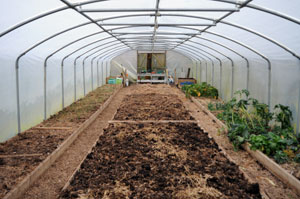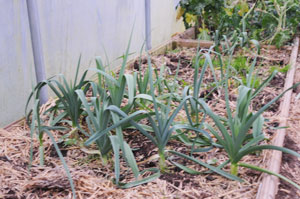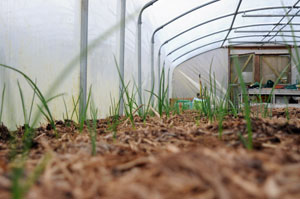Welcome to Relaxed Farming
- Alpacas
- Chickens
- Dairy Goats
- Ducks
- Geese
- Pigs
- Pygmy Goats
- Quail
- Rabbits
- Sheep
- Turkeys
- Polytunnel
- Photo Stories
- Video Stories
- Food
- Smallholding Map
- 2013
- 2014


- August
- September
- October
- November
- December
- January
- February
- March
- April
- May
- June
- July
- August


- 1
- 2
- 3
- 4
- 5
- 6
- 7
- 8
- 9
- 10
- 11
- 12
- 13
- 14
- 15
- 16
- 17
- 18
- 19
- 20
- 21
- 22
- 23
- 24
- 25
- 26
- 27
- 28
- 29
- 30
- 31
Monday, 3rd February 2014
Our polytunnel is now in an almost dormant stage - we await the warmth of spring and an increase in the number of hours of daylight before we start planting out seeds and tubers for the coming year, though as you can see in the photos our leeks and brassicas are still providing us with fresh veg (the carrots are hiding behind the camera) and the autumn planted onions and garlic (planted on 4th November) are shooting well.
We have spent a fair amount of time and a lot of energy moving compost from our 'heap' to the raised beds giving the worms time to get to work. We rely on the worms to really mix up the compost with the old layers of soil, all ready for when the main planting starts in the spring. Once the beds warm up we can start planting, the next vegetables to go in will almost certainly be our potato tubers (chitting nicely in our garage, see entry on 8th January).
One of the delights of the polytunnel is the ability to work no matter what the weather - this is also a benefit as far as watering the plants is concerned as we get to determine just how much water is given to each bed ensuring that delicate seedlings do not get washed away, or that below the ground crops such as carrots and parsnips do not get too wet and rot.
Our plans this year are once again to try and be as self-sufficient as possible with veg, though this does mean we will not be eating courgettes for some considerable time, and when the asparagus pops its head up we will be inundated for two to three months with this delicacy. Without transporting food from around the world it is impossible to eat 'any' veg at 'any' time - perhaps something to consider when one thinks of food miles?


